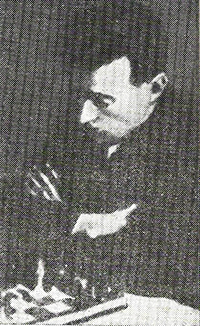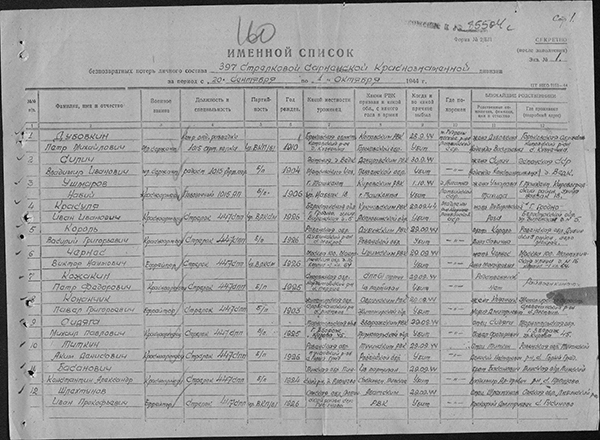9 June 2015
They did not return from the battlefield. Vladislav (Vladimir) Silich
Grandmaster Evgeniy Solozhenkin looks into the fates of Soviet masters died in battle during the Great Patriotic War.
Vladislav (Vladimir) Silich (1904–1944)

V. Lvovsky, Nugget (Collection Belorussian sportsmen in battles for Motherland. Minsk: Polymia, 1985. p. 152-155):
There are people, meeting whom makes pleasant sweet memories for a lifetime.
I was lucky to meet such person in summer 1936. At that time I was an executive editor at Krichevsk local newspaper in Mogilev region. I devoted almost all my free time to chess. I won a regional event and qualified for the Republic championship semifinal. The competition was held in Mogilev.
Representatives of many cities and districts of Belorussia were sitting at the tables in a big hall in front of lacquered black and white chess pieces. A tall slender man with a pleasant smile and friendly look hastily entered the room. He friendly welcomed the audience and quietly took place in the far corner of the hall.
“It is Silich, whispered my neighbor Nikolai Ratnikov, the first category player from Gorky.”
During the competition we saw Silich every day in the playing hall and at the hotel. Young people worshiped this wise, but very plain and responsive man. Sometimes players who adjourned their games in a complicated position asked the master to help them analyzing. He was always ready to help, sat at the board, looked at the position and started showing different variations. Playing the game after his analysis was easy. Even with a small advantage he was able to find the quickest way to win. And when the game was adjourned in a worse position, he would find smart and unexpected defending resources. Thus, days of competition actually turned to days of study and master class for young participants of the semifinal.
I met Silich for the second time in 1937, during my military service. One day I saw posters announcing the arrival of Belorussian champion, USSR chess master of sports V.I. Silich, who would give a lecture "My research of Chatard attack" and give a simul.
The lecture was incredibly interesting. On the demonstration board master showed new variations he had found in a well-known opening. Here we saw dangerous attacks and counterattacks, sacrifices splashed one by one. Only two players were able to make draws in the simul, others, including me, lost quickly.
... Many inhabitants of Vitebsk were interested in the fate of Silich. But no one of his relatives lived there, so it was impossible to find out anything about him.
Recently I had learned that two daughters of Silich lived in Molodechno. I was sent on an official trip by the regional newspaper "Vitebsk worker". At first I was not lucky: at the clothing factory, where his elder daughter Natasha worked, I was informed that she was on vacation. They gave me her address and phone number. I called to find out about the younger daughter of Silich. I was answered that Lilia Vladimirovna Silich is a teacher at school №6, and her new last name is Rebikova. Lilia Vladimirovna was very excited and glad. She showed documents, and told about many pages of her father's life.
...His real name is Vladislav. His wife Nadezhda Konstantinovna for some reason didn't like this name, calling husband "Vladimir". He put up with it and later introduced himself as Vladimir Ivanovich Silich. The patronymic of his daughters is also Vladimirovna. So let us call him Vladimir, too.
Vladimir Ivanovich Silich was born in 1904 at the station Tapy near Tallin in lawyer's family. His father Ivan Nikolaevich was Belorussian, born in Mstislavsk district of Mogilev region. His mother Evgenia Savinovna also came from Belorussia. The family wanted to live in the homeland all the time, and soon they moved to Vitebsk.
On the corner of Kanatnaya and Vokzalnaya streets in Vitebsk (nowadays Dmitrova and Kirova) there was a workmen's club named after the Paris Commune with a room for chess and checkers amateurs. Silich was always there and soon became one of the top chess players in Vitebsk.
What brought him success in competitions? Books and periodicals, for which he regularly subscribed, were his trainers. He allotted a lot of time for studying chess theory and analysis of games. His brilliant chess talent multiplied by tireless self-improvement delivered him great results. Soon Silich became the strongest chess player not only in Vitebsk, but in all Belorussia.
The Soviet team chess championship was held in 1927. The team of Belorussia led by Silich took the first place in a tense struggle.
The year 1928 was very successful for Silich. IV All-Belorussian Congress of chess and checkers was held in Minsk, which included a championship event. USSR champion Petr Romanovsky participated in the men's event, as well as a strong master from Smolensk Konstantin Vygodchikov and some other well-known players. Silich shared 1st-3rd places with Vygodchikov and Model, becoming Belorussian champion.
A new success came in 1929. Silich was the first Belorussian chess player to receive the master's title for his successful performance at the VI Soviet championship.
At the VII Belorussian championship in 1934 Vladimir Ivanovich collected 12 points and became BSSR champion again. The master from Vitebsk defended the honor of Belorussia in 1935 at the semifinal of the All-Union Central Council of Labour Unions championship. Playing with strong opponents, he got 12.5 of 14 and advanced to the final.
At the Republican championship in 1936 master Veresov managed to win the first place. Later he became one of the top Belorussian and Soviet chess players. Silich finished second, but already in the next year Vladimir Ivanovich returned his title of Belorussian champion.
It turned out that for the next several years Silich did not take part in Soviet competitions and could not confirm his master's title. But when in 1939 he was sent to the All-Soviet competition of strongest candidate masters, he performed successfully: tied for 2nd-3rd places with future grandmaster Boleslavsky and fulfilled master's norm again.
He gave all his energy to the teaching young players. During local events he was very interested in achievements of children, the most talented were invited to the chess section at the sports club "Spartak", where he was a coach. One of his students Leonid Leiko, who lives in Vitebsk now, became a champion of Vitebsk Region after the war.
Vladimir Silich actively participated in correspondence competitions and tournaments, where he always got high places.
Before the Great Patriotic War Vladimir Ivanovich was the unchallenged editor of the chess section in the regional newspaper "Vitebsk worker". Old typographers remembered that he was particularly responsible in this position. Before publishing a new chess column he came to the printing-office and looked through with a censorious eye to find mistakes in texts and diagrams. The column was very popular among readers.
Margarita Ivanovna, a sister from Kislovodsk, said that the Great Patriotic War found Silich in Rostov-on-Don, where he took part in a chess tournament. He did not return home, as Vitebsk had already been occupied. He was called up for military service.
Here is a postcard Silich sent to his sisters in Kislovodsk. It is dated April 20, 1943. Vladimir Ivanovich informs that he was at the front all the time. On April 20, 1942 he was badly wounded by shrapnel from enemy's bomb. He was under treatment at the hospital in Saratov up to August 20, then he recovered his health in Pugachev until February 20, 1943, after which he was off at the front again.
Family of Silich, which lived in Molodechno, got a letter saying that in July 1943 he went missing in one of the actions.
This information was wrong. Brave soldier did not miss in action. From the archives of the USSR Ministry of Defence we got to know that Silich died during one of the fighting for the liberation of Soviet Latvia and was buried in Gudrany (correct is Gudreny – E. Solozhenkin), Latvian SSR.
He was not much remarkable, but very necessary and responsible soldier. Radio operator of the 1015 artillery regiment, 397th rifle division, junior sergeant Vladimir Silich secured reliable connection between commanding officers and artillery batteries".
Vladislav Silich died in battle near Sigulda on September 30, 1944. The battle lasted from September 25 to October 6 and is known as "Battle near More" in present-day history manuals. Latvian legion of SS troops, defending well-fortified positions near Sigulda, successfully deterred attacks on the front line of 12 kilometers length, and inflicted significant casualties to outnumbering Soviet units. Red Army losses compared to the losses of the legion were so big that calling these battle a military success was out of the question. On the night of October 6 the legion left Sigulda, and our troops occupied it without a fight. It enabled continuing the Riga Operation, which led to liberation of Riga on October 13.
Junior sergeant Silich was buried in Gudreny. Here is his death report:

After the war Soviet soldiers were reburied from Gudreny. Thanks to Alexander Rzhavin, executive member of the Russian community in Latvia, now we know the reburial place of Vladislav Silich. Also we can see the burial place on Google maps.
Alexander Rzhavin:
“That is right, it is referred to Sigulda suburbs. Gudreny exists up to now. Actually, there are three farms side by side – Gornie (Kalna), Dolnie (Lejas) and Uglovye (Stura) Gudreny. Soldiers should have been reburied at the Memorial in the village Mor. Sadly there is no name of Silich on this memorial headstone. Unfortunately this is a common problem: for example, Dubovkin was mistakenly eternalized 60 km to the south. To eternalize soldiers' names at the Memorial, a letter to the Russian ambassador in Latvia is needed.”

Memorial grave in Mor, Latvia
Sources:
B. Weinstein «Chess battles» (FiS, М. 1985)
Alexander Rzhavin
The United Data bank "Memorial"






















